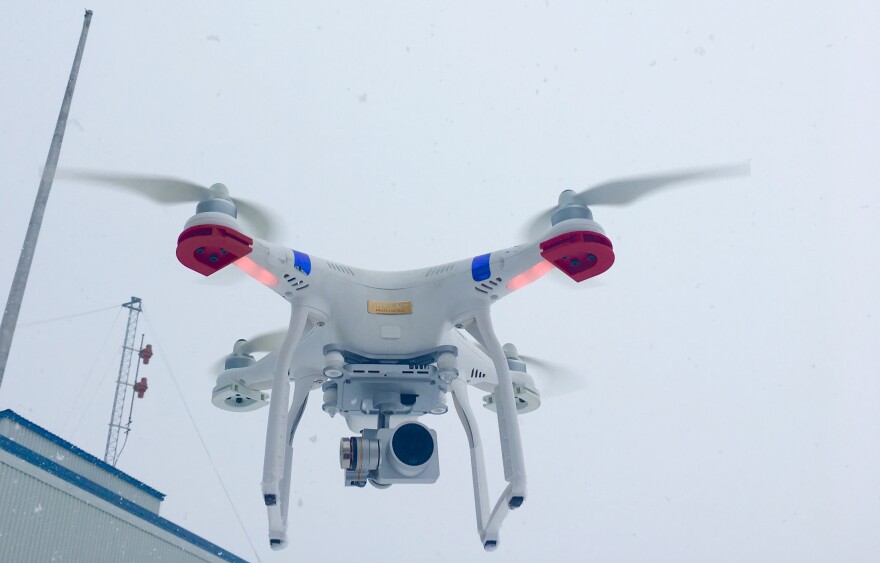Last week a Dillingham resident reported seeing a drone flying near his residence and around his neighborhood. As flying drones becomes an increasingly popular hobby, it can lead to questions. Can a drone fly through a persons yard? And what rights does a property owner have if one does?
Dillingham’s Michael Paisley was outside with his dog last week, when he realized that he was in the presence of an unwelcome visitor.
“We were just standing there in the woods waiting for her to do her business when I heard a weird hum.”
Paisley looked up to see a solid red light with green flashing lights around it.
“I instantly realized it was a drone,” he says. “I watched it zip over our heads and buzz around the second floor windows of our apartment complex, all the way around the whole house, and then back over the woods where we were standing, and then around the neighbor’s house around their windows and then back where it came from.”
Paisley didn’t call the police, but he did take to the Facebook to alert the neighbors.
“I just posted. I said, “peeping drone alert” because, I mean, why else would you be flying around at 11, 11:15 at night, looking around people’s windows or over people’s property unless you’re up to no good? So I just wanted let the neighborhood know that there’s somebody out peeping.”
Paisley says that others who live in the area have also noticed a drone flying around the neighborhoods between the Vitus gas station and Waskey Road.
As flying drones becomes an increasingly popular hobby, the relatively new technology raises questions about privacy and legality. Drones flying through people’s yards around near windows at night, might make some uncomfortable. But that in itself is not technically illegal says Dillingham Police Chief, Dan Pasquerello.
“The airspace in America is controlled by the FAA, so the airspace above your house, above your property is not your own. It’s public property,” says Pasquerello.
Even if it is not illegal to fly over someone’s yard, there are variations on that theme that could be a crime.
“If a drone is annoying you that violates the Alaska law of harassment. You could contact the police. We’ll investigate it and, if appropriate, file the applicable charge,” Pasquerello explains. “A worst case scenario is there’s a crime of indecent viewing or photography. That may be what people’s main fear is of drones spying in your window at night. In that case, that is a more serious offence, a felony offence that we could charge.”
Then there’s the question of vigilante justice. As Dillingham’s residents discussed the drone sighting, some suggested it should be shot down. Pasquerello says, however, that to do so would be illegal.
“If you shoot down a drone you’re destroying another person’s property. You could be charged with the Alaska statute of criminal mischief. Plus, discharging a firearm within city limits carries its own municipal ordinance violation of a $75 fine.”
Senator Shelley Hughes, who has co-chaired a legislative task force on the issue since 2013, reiterated that point in an interview two years ago.
“No, you cannot they’re aircraft,” she says in response the question of whether or not property owners can shoot a drone flying above their land.
Hughes adds, “We have to realize that although some of these may be under a $100 in the hobby store. If they’re a commercial user, they can be up to $100,000, and from the ground they can look the same. So it’s someone else’s property. If they are hovering over your private property and you feel like your privacy is being invaded, that’s when you call your local law enforcement.”
The task force published guidelines for safety and privacy. It clarifies that Alaska’s Constitution protects individual’s privacy. It also reiterates that, by the U.S. Constitution’s fourth amendment, law enforcement must obtain a warrant before search and seizure. This standard also applies to search by drone. A 2014 state law established specific training and protocol required for police drone use.
Federal laws largely pertain to the safety of airways, like requiring drones to fly below 400 feet and to avoid operating near airports. Some states, like California, Florida, Texas, Mississippi have laws that specifically address private citizens capturing images or video by drone. For now though, law enforcement in Alaska uses existing privacy law to address those issues.
Contact the author avery@kdlg.org or 907-842-5281.



